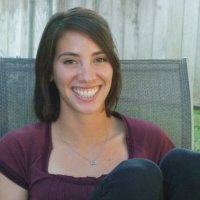Kara Bellucci, this year’s Minority Nurse Scholarship winner, never considered nursing as a potential career. Lacking the confidence to dive into hard sciences, and with a real passion for family, race, and class issues, Bellucci’s life changed when she spent three years as a Peace Corps volunteer in Malawi, Africa.
“When I came back to the States, I realized that one-to-one connection was the common thread,” she says. Bellucci began on a path to nursing that included taking some classes to prepare for nursing school and to complete requirements beyond her bachelor’s degree in women’s studies from the University of California, Davis. Now a nursing student at Columbia University’s intensive 15-month master’s program, Bellucci will launch immediately into Columbia’s 3-year-long clinical doctoral degree program upon completion of the master’s degree work.
“Nursing came to me organically,” she says. “I didn’t think connecting with people was a skill I could translate into work. Nursing was reaching out to people and it’s a holistic approach. It’s about physical and emotional wellness. I didn’t know that kind of nursing existed.”
The connections Bellucci forms with people is what grounds her to a career in nursing. In Malawi, she says one of her roles was to help connect a group of women bakers with other resources in the community so they could bake and sell products. The satisfaction in helping the women, seeing them thrive, and being a part of that made a huge impact on Bellucci. “A lot of that is in nursing,” she says. “It’s connecting people with resources.”
And Bellucci has also spent time as an outreach worker for people in single occupancy hotel rooms and on the streets in San Francisco. Bellucci, who was unfamiliar with the surroundings, says she had a lot of misconceptions about the community at first. And the realization that her own bias could impact her nursing was powerful. Despite different backgrounds and lifestyles, Bellucci says she still formed connections based on common threads with the people she was helping and the goal of safety and health.
“I realized that it’s going to be important through this career to check in on the different layers of my identity,” she says. The process will help her take a step back sometimes and consider how her own life experience could change how she sees something.
Eventually, Bellucci would like to go into family practice where the connections with patients often span decades and generations as well. “You can develop longevity with patients,” she says. “That’s an environment I would enjoy.” And Bellucci says she can see eventually circling back to her global experience to somehow get involved with international nursing.
For now, Bellucci says the scholarship will help her financially so she can get the skills she needs first. But it also serves as a reminder, she says, and a validation for how important nursing is.
“It’s a nice affirmation to find out there are others who think there’s more diversity to be brought into the field,” she says. “It’s an affirmation and the excitement for that.”
And like most nursing students, Bellucci says she is apprehensive about the student debt she is accruing as is her family. “To tell them I got the scholarship was reassurance that other institutions believe in me too,” she says. “It’s a nice confidence vote.”
- WOC Nurses Week Highlights Specialty - April 16, 2024
- Honoring Radiology Nurses Day on April 12 - April 12, 2024
- Travel Offers New Career Possibilities - April 8, 2024



